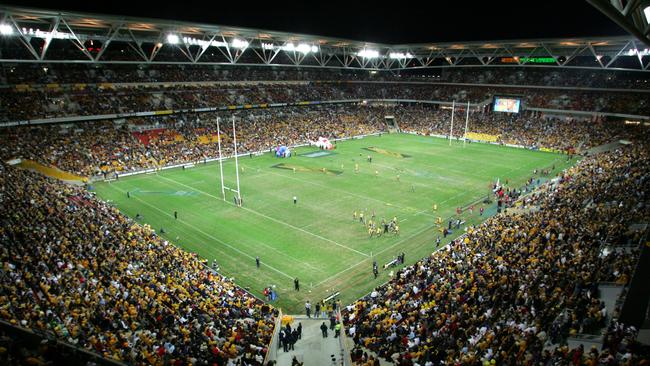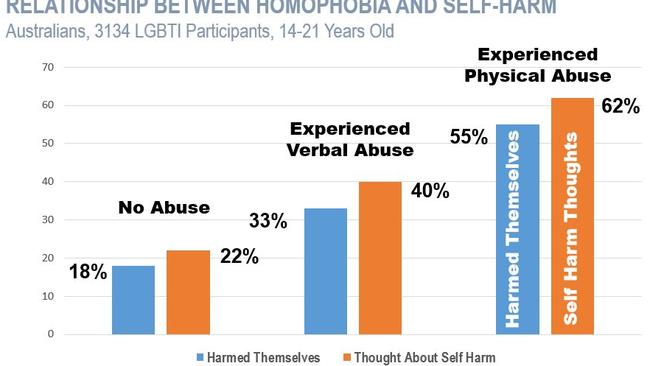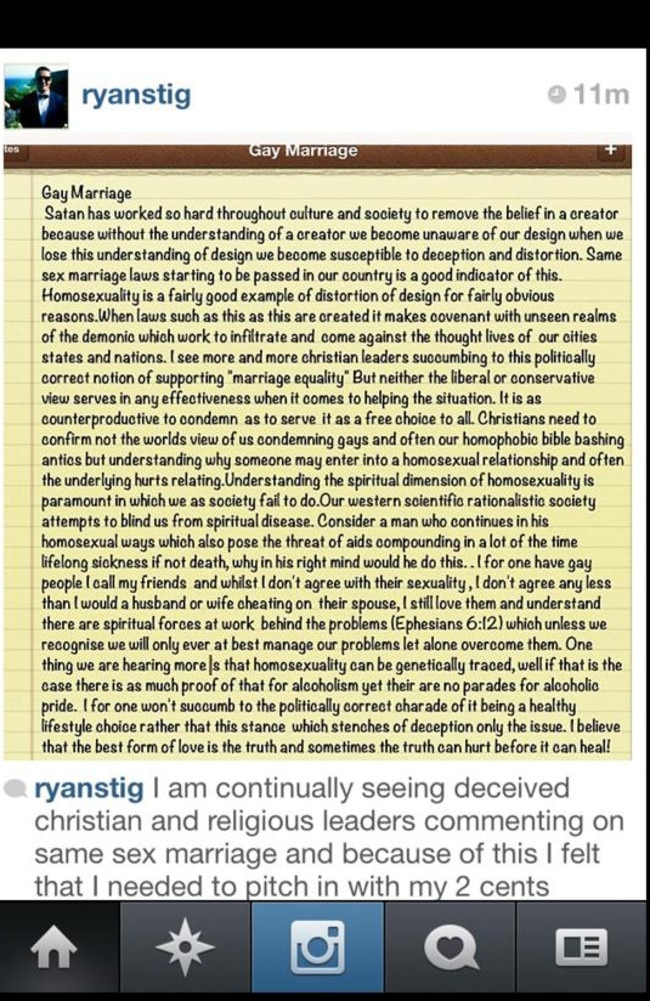Why I’m terrified to attend a game of football
THERE’S something that terrifies me about the thought of going to the football. No joke. I’m petrified. And here’s why.

THERE’S something that terrifies me about the thought of going to the football.
No joke. I’m petrified.
The suggestion of attending an NRL or soccer game in person causes me such anxiety I’d rather eat a hot chilli. Or walk on fire. Or walk the tightrope. Whatever it is, I’ll take the other option.
Football clubs across the different codes have spent millions of dollars on creating the idea that the game of football is all about community spirit — and while that might be true, I feel one requires a checklist to meet that criteria. In other words, don’t be different. And I’m very different.
Full admission, I’m a flamboyant gay man, and I’ve not been shy in sharing stories about life as a gay teenager in the suburbs, so you might understand why it would be a terrifying thought for me.
I don’t follow the football per se — and I might be wrong — but what I see at certain times of the year, particularly when the Origin is on, is aggressive, testosterone-fuelled behaviour. And I want nothing of it.
In fact a straight male friend of mine told me that for some football fans, calling them gay, or a poof, or the f-word, is the “ultimate insult”.
Those big groups of blokes interviewed on the television before or after big games are exactly the types of people I work to avoid. In my experience, large groups of football loving, beer chugging men are a sign that danger could be ahead.
It all probably stems back to the days where the type of person who made my life a living hell, resembles that type of person on the television screen.
If I was to ever attend a football game as a spectator, I can picture it now; my eyes darting across the crowd, looking for potential threats, spotting any spectators that could prove dangerous. Spotting the exits. Figuring out an escape route. And trying to remain as invisible as possible. This is not unusual for me, I’ve spent half of my life doing so in these situations.

It’s not like the football community is especially embracing and I’m sure I’m not alone in my fears, considering a 2015 study ‘Out on the Fields’, conducted by research outfit Repucom, found that 80 per cent of Australians have witnessed or experience homophobia in sport.
In fact when former Newcastle Knights footballer Ryan Stig referred to homosexuality as a “spiritual disease” in 2013, he personally wrote to me after my angry response to tell me that “I know it to be true that you are not born this way, I had dinner with a guy who was gay for 17 years on Saturday night before he met Jesus”.
I’ve spent many years fighting for gay rights. I’ve interviewed straight men on the topic, I’ve worked with Jason Ball, the first Aussie Rules player to ever come out, for our website, so I know there are plenty of good eggs out there.
But I’m not willing to risk my safety because a handful of homophobic men can’t control themselves.
Granted, issues with homophobia in sport is not all that different worldwide. Last year, English Football Association chairman, Greg Clarke, said he was “personally ashamed” that no professional footballers had felt they were able to come out in England, and, more frighteningly, that he believed they would suffer “significant abuse” if they did so.
Meanwhile earlier this year, Sydney Rangers FC, Australia’s first gay soccer club, called for a way to turn a “negative situation into a positive” after Western Sydney Wanderers fans unfurled an offensive banner of Sydney FC coach Graham Arnold engaging in oral sex before a crowd of nearly 45,000.
“It was very confronting. It instantly sends out a message that it’s okay to mock people based on sexuality,” Rangers president Joseph Roppolo told AAP.
“It shows a lack of education around the issues that affect LGBT people.
I’m sure I’m not alone, and in fact some women have experienced similar, if not more frightening experiences than myself.
A colleague of mine assured me that clubs’ effort to maintain the “family game” had worked, and that most of the crowd was in fact young couples who wanted a peaceful experience just like myself. But am I willing to take that risk?
“We’ve been quite surprised to find that so far young people actually experience more homophobia in sport than older generations,” Erik Denison Lead Researcher, LGBTI Sport Inclusion Project at Monash University, told news.com.au.
“We need to figure out why that is and what could be causing that. Our initial theory is that they’re [victims] more likely to be out of the closet, so that makes them targets, being out, loud and proud.
“When you’re in an environment like sports, that could create a target on your back.”
Mr Denison said researchers found those who expressed homophobia in sport weren’t necessarily homophobic in other areas of their life, but when it came to the field, no f*gs allowed.
“It’s not a traditional hate where sporting teams would go to Oxford Street and bash gays like they did in the ‘80s.
“When you’re in a hyper masculine environment, or a woman is playing tough, calling them fags undercuts their ability to play sport.”

Mr Denison, a football fan himself, told news.com.au he had experienced homophobic slurs as a spectator at three different types of football codes.
“A guy a few seats away was yelling fa**ot and p**f every few minutes, he was a big guy.
“We ended up moving.”
It’s quite tragic that for Australia’s premier codes, it’s not as focused on equality or open to the idea of change.
Sadly, 75 per cent of Australians believe an openly gay person would not be safe as a spectator in the stands of a sports game. In fact spectator stands were identified as the most homophobic of all sporting environments, which isn’t quelling my fears over my safety.
“There’s no reason to suggest that would change,” said Mr Denison.
Granted, I have been to one AFL match before, ironically I was dragged there by a fervent gay rights supporter, whose love of the game knows no bounds.
He’s assured me throughout the years that I would feel safe, but honestly, I’m just not there. Football and flamboyancy just doesn’t seem to mix.
Share your story — youngma@news.com.au



